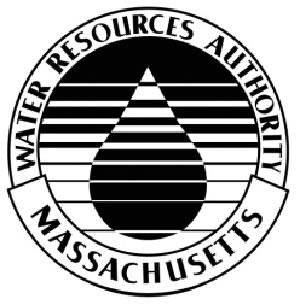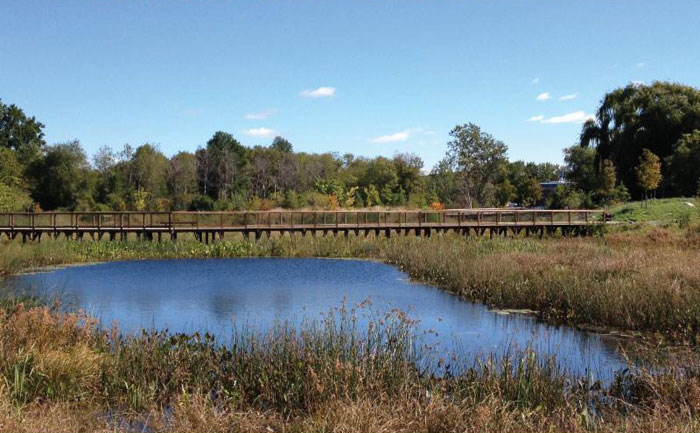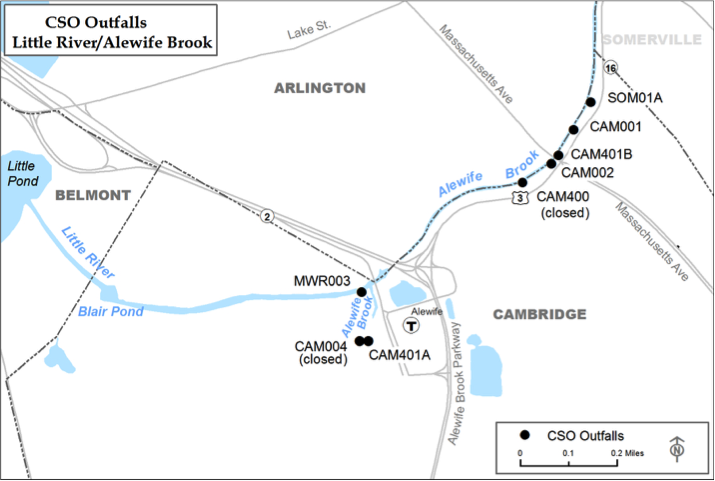This notice is required by the Massachusetts Department of Environmental Protection (DEP) as an annual update on the progress of Combined Sewer Overflow (CSO) control measures to improve the water quality of Alewife Brook. You are receiving this notice because your property lies within the extended 100-year floodplain of Alewife Brook as established and currently in effect by the Federal Emergency Management Agency (FEMA).
The water quality of Alewife Brook is often impaired due to bacteria and other pollutants from a number of sources, including cross connections between sanitary sewers and storm drains, urban stormwater runoff, and CSOs. During both wet and dry weather, the water quality of Alewife Brook can be impaired and fail to meet state bacteria standards for fishing and swimming.
CSO Outfalls at Little River/Alewife Brook
Note: Four additional CSO outfalls along Alewife Brook (not shown) were permanently closed by the City of Somerville.
Portions of Cambridge and Somerville are served by combined stormwater and sanitary sewer systems common in older cities. Six CSO outfalls along Alewife Brook can release an untreated mix of stormwater and sanitary flow during large storms when stormwater can overwhelm the capacity of the combined sewers. While these discharges can impair water quality, they provide critical relief to the sewer system when flows exceed capacity, preventing sewage backups into homes, businesses and streets.
As part of the Federal District Court Order in the Boston Harbor Case (D. Mass. C.A. No. 85-0489-RGS), the Massachusetts Water Resources Authority (MWRA) is required to undertake certain corrective actions to reduce or eliminate CSO discharges along Boston Harbor, the Mystic, Charles and Neponset rivers and Alewife Brook. MWRA and its communities with permitted CSO outfalls, including Boston, Cambridge, Chelsea and Somerville, have been reducing CSO discharges continuously since the 1980s. Major improvements to the regional wastewater collection and treatment system by MWRA and local system improvements by the communities, including the separation of combined sewers with construction of new storm drain systems, have contributed to the closing of many CSO outfalls and an 88% reduction in the total volume of CSO discharge.
In December 2015, MWRA, in partnership with the CSO communities, completed the last of the 35 projects in the Long-Term CSO Control Plan approved by the U.S. Environmental Protection Agency (EPA) and DEP and mandated in the federal court order. Since the program began, MWRA has effectively met more than 180 federal court schedule milestones related to CSO control.
Seven of the 35 projects have contributed to the control of CSO discharges to the Alewife Brook. Together, these completed projects have closed six CSO outfalls (half of the outfalls that were active in the late 1980s) and are predicted to reduce average annual CSO volume to Alewife Brook by 85% and reduce the frequency of CSO discharges among the six remaining outfalls from 63 activations a year to seven activations a year. Remaining CSO discharges are predicted to comply with Class B “fishable/swimmable” water quality standards 98% of the time.
For more information about these and the other projects in the Long-Term CSO Control Plan, their CSO control benefits, and water quality conditions and improvement, see MWRA’s final CSO Annual Progress Report, filed with the Federal Court in March 2016.
MWRA continues to meet its remaining federal court obligations and state and federal regulatory requirements related to CSO control. The federal court schedule includes two remaining milestones: commencement of a 3-year post-construction monitoring program and CSO performance assessment by January 2018 and submission of a related report to EPA and DEP by December 2020 intended to verify that CSO discharges meet the levels of control in the approved Long-Term Control Plan.
On August 31, 2016, DEP issued a determination extending the water quality standards variance for CSO discharges to the Alewife Brook and Upper Mystic River by another three years, to August 31, 2019. The variance extension and a supporting fact sheet can be found on the DEP website. The variance extensions since 2000 have included conditions requiring MWRA to conduct certain water quality sampling, CSO reporting and proper sewer system operation and maintenance to minimize CSO discharges, as well as implement the Long-Term Control Plan in compliance with the federal court schedule. The current variance extension requires MWRA to submit a modified water quality monitoring program by December 2016 (completed) and a scope of work for the 3-year post-construction monitoring program and CSO performance assessment by May 1, 2017, which DEP intends to issue for public review.
DEP plans to reissue the variance through 2020, after which it intends to make long-term determinations on water quality standards and related level of CSO control for Alewife Brook/Upper Mystic River with information gained in part from the water quality sampling and the court-mandated CSO performance assessment.
During large storms, CSOs are released to Alewife Brook. Because of increased health risks associated with CSO discharges, public health officials recommend avoiding contact with waterbodies during rainstorms and for at least 48 hours following a CSO release, as there may be increased health risks due to bacteria or other pollutants. It is important to understand that floodwaters from extreme storms, in all cases, can present health risks, and proper precautions are necessary to minimize these risks during flooding events. DEP has developed guidance for homeowners for responding to flooding onto your property from large storms or sewer backups.
For more information on CSOs and the CSO control program, visit MWRA’s, Cambridge’s and Somerville’s websites, at:
http://www.mwra.com/03sewer/html/sewcso.htm
http://www.cambridgema.gov/theworks/ourservices/stormwatermanagement
http://www.somervillema.gov/departments/dpw/engineering





